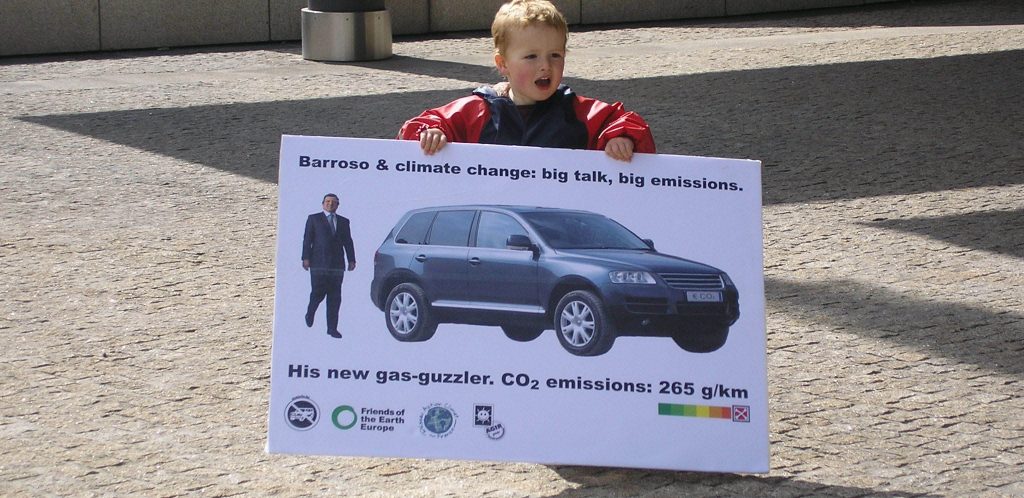Brussels, 24 March 2006 – The EU summit has adopted an energy strategy that will undermine global efforts to drastically cut down greenhouse gas pollution in order to limit dangerous climate change, Friends of the Earth charged today.
The “Energy Policy for Europe”, agreed last night, aims at securing yet more oil and more gas imports and fails to make energy efficiency and renewable energies its central priority.
Jan Kowalzig, energy campaigner at Friends of the Earth Europe in Brussels, said:
“The European leaders missed an opportunity to make history and put Europe’s energy on a path towards a sustainable future. Unbelievable but true: The leaders of the new European Union of 25 member states are clinging to an old energy policy.”
“Europe’s leaders have yet to learn a simple lesson: The most effective way to secure our energy supply is to cut back Europe’s huge demand by investing massively in energy saving technologies. Cutting energy waste must be one central pillar of any coherent European energy policy.”
The agreed strategy, an “Energy Policy for Europe”, largely follows the European Commission’s recent Green Paper on Energy [1] and last week’s conclusions by the EU industry and economy ministers at the Energy Council meeting [2]. Particular attention is given to new external policies in order to secure long-term oil and gas imports into the EU. [3]
A proposed regular “Strategic EU Energy Review”, which is part of the energy policy, would aim to allow a transparent debate on the advantages and drawbacks of all energy sources, including nuclear power – a technology that Friends of the Earth believes has no role to play in a sustainable energy mix for Europe.
Jan Kowalzig commented:
“Common economic sense would send nuclear power finally into the museum if a Strategic EU Energy Review would include all aspects of nuclear power, including the costs of waste storage for thousands of years and the consequences of a serious nuclear accident.”
The new strategy also calls for a “Road Map” for renewable energies and suggests raising the share of renewables energies to 15% of Europe’s energy consumption by 2015. This is unacceptable because if the current target for 12% renewable energies by 2010 is met [4], the new target would mean that five years later the share would increase by only 3%.
But Europe can be far more ambitious: By 2020, it could easily meet 25% of primary energy consumption from renewable sources. [5]
Friends of the Earth also criticised that the agreed energy strategy fails to include proposals to phase out perverse subsidies for conventional forms of energy, which according to the European Environmental Agency sum up to more than 20 billion Euros every year.
In addition, the 40-70 billion Euros in hidden costs of producing conventional energy, such as health costs from air pollution, should be internalised into the price of fossil and nuclear energy. This could be done through a dirty fuel tax that could recycle revenues back to renewable energies and energy saving measures.
***
Notes:
[1] “European Strategy for Sustainable, Competitive and Secure Energy”, European Commission, 8 March 2006, at http://europa.eu.int/comm/energy/green-paper-energy/doc/2006_03_08_gp_document_en.pdf — Friends of the Earth’s critical response to the Green Paper is available at http://www.foeeurope.org/climate/download/briefing_GreenPaperEnergySupply.pdf
[2] Conclusions of the 14 March 2006 EU Energy Council are available at http://ue.eu.int/cms3_applications/Applications/newsRoom/LoadDocument.asp?directory=en/trans/&filename=88806.pdf
[3] The agreed strategy will also mean that the EU’s energy policy would strive for securing Europe’s energy needs, ensuring competitiveness of European industry and promoting environmental sustainability. Heads of State emphasised the need to develop a coherent energy policy, but that such policy should not undermine a country’s sovereign choice over its energy mix. The next European Council in June will focus on the external policy aspect of energy. The conclusions of the EU Heads of State Spring Summit will be available from http://ue.eu.int/cms3_fo/showPage.asp?id=668&lang=en
[4] This target was set by the Renewable Energy Directive (Directive 2001/77/EC), which assigns voluntary targets for each Member State. Targets are set as shares of renewable energy meeting electricity energy needs, amounting to 21% of total electricity use. This corresponds to 12% of primary energy needs.
[5] As shown e.g. in a study by the Wuppertal Institute, commissioned by WWF: “Target 2020 – Policies and Measures to reduce GHG in the EU”. See http://assets.panda.org/downloads/target_2020_low_res.pdf






